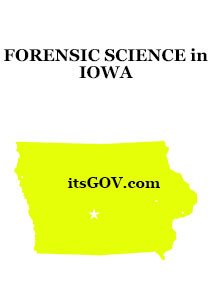Forensic Science
Forensic science combines science and investigation in order to aid and support the prosecution or defense in criminal and civil investigations. While the profession has been widely romanticized by various TV shows, make no mistake – this job is most likely different that you expect. In contrast with popular perception, this is a highly scientific role, which often involves detailed, painstaking work. Field duties are limited to a few areas of expertise, and most often than not a forensic scientist will spend his time in the lab.
If you made it this far, though, congratulations! You’re taking the first steps in joining a very rewarding profession and itsGOV is here to guide you through what you need to know and what you need to do to join a forensic science program in West Virginia.
Depending on the type of forensic science practiced, different degrees and educational backgrounds may help a candidate get a job and excel in this field. Regarding formal education, requirements vary across jobs, but you should definitely have a solid background in mathematics, biology and chemistry.
The National Institute of Justice, a division of the U.S. Department of Justice, offers guidelines for model undergraduate and graduate forensic science degree programs. According to the American Academy of Forensic Science, strong programs should offer a curriculum that concentrates on scientific writing, laboratory skills, public speaking, and computer software application training.
Forensic Science Requirements in West Virginia
Forensic science is one of the fastest-growing fields in the U.S. with a predicted job growth of 20 percent by 2018. Most forensic science jobs are within the criminal justice system, including state/local government, the FBI, the DEA and the U.S. military. However, private laboratories and educational institutions also employ forensic scientists.
West Virginia is home to six schools with forensic science degree programs, including master’s degree programs, which graduate approximately 85 students every year.
According to the Bureau of Labor Statistics, forensic scientists in West Virginia earn an annual mean wage of $37,800. However, persons who live in the northeastern end of the state and work in the greater Washington D.C. metropolitan area, tend to earn roughly twice as much, or an annual mean wage of $74,500
There are currently over 50 forensic scientists employed in West Virginia. The general requirements that must be met for a forensic science job are:
- Bachelor’s degree in forensic science or a natural science from an accredited four-year college/university
- Successfully pass a background check
- No criminal record
- No use of controlled substances
Forensic Science Training in West Virginia
Located in South Charleston, the fully accredited WVSP crime lab offers full-service analyzes of evidence collected from criminal investigations free of charge to all law enforcement/criminal justice agencies in West Virginia. Services provided include:
- Drug Identification – Identification and analysis of controlled substances
- Toxicology – Analysis of blood alcohol content; examination of blood and urine for presence of drugs
- Trace Evidence – Identification and comparison of hair, fiber, paint, glass, etc.
- Biochemistry – Analysis of biological substances
- Latent Print – Analysis, comparison and verification of friction ridge skin impressions
- Firearms/Toolmarks – Identification/comparison of firearms, ammunition components and Toolmarks; distance determinations
- Questioned Documents – Analysis and comparison of questioned documents
Information regarding employment with the WVSP forensics laboratory is available from the state employment office, 304-766-2600.The WVSP digital forensics laboratory is located on the third floor of the Marshall University Forensic Science Center in Huntington, WV. The state-of-the-arts facility specializes in mobile forensics in order to fill the needs of WV law enforcement officers in relation to digital evidence, cell phones or internet-based crime. The lab utilizes “imaging” which creates an exact duplicate of the digital information for analysis. The lab currently processes about 30 pieces of evidence every week; roughly 80 percent of the evidence is related to child exploitation. The Marshall University Forensic Science Center in Huntington, is not just a top-notch facility for forensic science students, but it also provides critical assistance to the West Virginia criminal justice community. The nationally accredited DNA laboratory accepts samples from state and local law enforcement/criminal justice agencies which are analyzed and compared on CODIS, the national DNA database. The labs staff, all of whom have master’s degrees in forensic science, process testing samples for both criminal and civil (paternity testing) cases. The center is also involved in various innovative DNA projects.
Forensic Science Salary in West Virginia
Fifty forensic science technicians were employed in West Virginia in 2012 according to the Bureau of Labor Statistics (BLS). Workforce West Virginia projects that there will be a 1.62% increase in the availability of these jobs per year in the period from 2010-2020. They also indicated that twelve establishments reported employing forensic science technicians in 2011.
The BLS indicates that the average annual salary for these scientists was $37,800 a year in West Virginia in 2012. Those in the 90th percentile of their wage bracket made an average of $50,100 that year.
Forensic analysts working for the state of West Virginia make a range of salaries depending on their level of experience and job responsibilities. There are five categories of this job type with level I being the starting position and level V employees being head of a section. Their salary ranges for 2013 are listed below:
- Forensic analyst I: $29,400 – $54,396
- Forensic analyst V: $39,372 – $72,840
The state’s two forensic labs are major providers of forensic scientist positions in the state. The West Virginia State Police have a forensics lab in Charleston that provides services to law enforcement agencies throughout the state and handles about 3500 cases a year. In addition, the forensic science center at Marshall University in Huntington works with the state police to analyze DNA profiles through the CODIS (combined DNA index system) database.
One category of forensics is handling evidence at the scene of the crime. Such work is done by crime scene investigators (CSIs) who can be either civilian employees or sworn officers. West Virginia provides both types of crime scene investigator positions.
CSI services are provided by the scientists of the forensic lab in Huntington. In other cases, detectives with forensic training process evidence at crime scenes. The average CSI position in West Virginia paid $55,000 in the year leading up to October 2013 according to Indeed.com.
Forensic Science Schools and Colleges in West Virginia
Bachelor’s Degree Programs in West Virginia
| University | Fairmont State University, Forensic Science B.S. |
| Duration | 4 years |
| Type | Full time, Part time |
| Tuition and fees | $16,200 per year |
| Program link |
| University | Fairmont State University, Forensic Science B.S. |
| Duration | 4 years |
| Type | Full time, Part time |
| Tuition and fees | $24,500 in-state; $28.020 out-of-state per year |
| Program link |
| University | Fairmont State University, Forensic Chemistry B.S. |
| Duration | 4 years |
| Type | Full time, Part time |
| Tuition and fees | $24,500 in-state; $28.020 out-of-state per year |
| Program link |
Master’s Degree Programs in West Virginia
| University | Marshall University, Forensic Chemistry M.S. |
| Duration | 4 years |
| Type | Full time, Part time |
| Tuition and fees | $11,712 in-state; $15,992 out-of-state per year |
| Program link |



